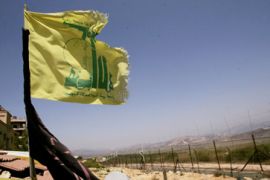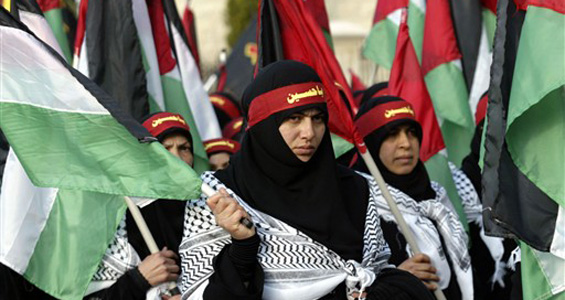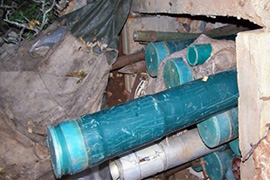Lebanese fear conflict with Israel
Some Lebanese are concerned that southern Lebanon will become a second front in the war.

 |
| Hezbollah supporters carry Palestinian flags during a march in Nabatia, southern Lebanon [AFP] |
While the conflict in Gaza goes on, some worry that a second front could open – in south Lebanon.
“Everyone here is scared of war,” said Sami Ghandour, a 23-year-old car dealer in Nabatia, southern Lebanon, several days after rockets were fired into Israel from Lebanon.
“I lost my home in the July [2006] war. We feel for Gaza, because we know the damage Israel can do. We experienced it in 2006.”
Rockets fired
On Wednesday morning, at least three rockets fired from southern Lebanon hit northern Israel. No one claimed responsibility and Hezbollah denied any involvement.
Israel responded immediately by firing eight rockets into Lebanon.
In a similar attack last Thursday, at least two katyusha rockets were fired into Israel from southern Lebanon, prompting concerns of renewed conflict between the two long-time foes.
Hezbollah immediately denied any involvement, even though the previous day it publicly stated that people should “be ready for anything”.
| IN DEPTH |
 Latest news and analysis from Gaza and Israel |
 Track the war and submit your own reports |
 Send us your views and eyewitness videos |
 Watch our coverage of the war on Gaza |
Still, Israel seemed to take it at its word by retaliating with relative restraint – five artillery shells.
It is now believed that the rockets came from a Palestinian group.
Fouad Siniora, the Lebanese prime minister, harshly condemned the rocket attacks on Israel, which violated United Nations security council resolution 1701, which put an end to the war in 2006.
“Lebanon denounces and condemns the firing of rockets and the retaliatory action and believes that such action is in violation of UN security council resolution 1701,” Siniora said in a statement.
This followed intense fighting in Gaza, between Israel and Hamas – a cause Hezbollah supported in the summer of 2006, which led its country into a 33-day conflict leaving approximately 1,000, mainly Lebanese civilians, dead.
Now, as the body count in Gaza approaches the same number, many wonder if Hezbollah will get involved, as it has in the past.
“There are numerous ways Hezbollah could become involved in the ongoing conflict in Gaza if it deems such involvement in its interests – indeed there are a range of such means including ones which could be viewed as ‘reasonable’ and/or justified by important segments of its political constituencies and allies,” notes Nicholas Noe, a Beirut-based political analyst and editor of Mideastwire.com.
“If the situation worsens in regards to Hamas’s position then the likelihood of Hezbollah’s involvement rises.”
Restraint urged
Unifil has urged restraint in the wake of the recent exchange of fire.
The international peacekeeping organisation has some 13,000 troops from various countries stationed in southern Lebanon.
The force, which was set up in 1978 to monitor the border between Israel and Lebanon, was considerably boosted in the wake of Israel’s 2006 war on Lebanon. In the past several days they have boosted their patrols and troop presence along Lebanon’s southern border.
On Friday, Unifil found an old weapons cache inside two disused bunkers located between the hills of Kafer Chouba and Kafer Hammam in the eastern sector of Unifil’s area of operations in south Lebanon.
 |
| Unifil’s discovery of an old weapons cache has increased talk of a possible conflict [AFP] |
Major-General Claudio Graziano, the Unifil commander, said, in a press release: “In accordance with UN security council resolution 1701, Unifil and the Lebanese Armed Forces (LAF) are taking concrete measures to ensure that the area between the Litani River and the Line of Withdrawal (Blue Line) is free of any armed personnel, assets, and weapons other than those of the government of Lebanon and of Unifil.”
He added: “Recent developments have prompted us to enhance our joint presence on the ground. It was in the course of this intensified patrolling activity that the weapons cache was found.”
The discovery of the weapons cache has only increased talk of the possibility of renewed conflict in south Lebanon.
Still, some see talk of a renewed conflict between Israel and Hezbollah as just that – talk.
“I think this is unlikely, Israel does not want a war on two fronts – at least, not yet – and Hezbollah does not want to face further disruption of its growing political status inside Lebanon where it enjoys a virtual veto over the Lebanese government,” said George Joffe, a lecturer on the international relations of the Middle East and North Africa at the Centre of International Studies at Cambridge University.
“Israel’s restraint – five artillery shells against three rockets – was a measure of its desire to avoid escalating the active enemies it faces and its realisation that the responsible party was not Hezbollah.”
Mixed opinions
Amine Kuwayess, a 25-year-old resident of Nabatia, says he is not worried about a repeat of the 2006 war.
“There won’t be a war. Hezbollah has more weapons than Gaza,” he said, adding, “Israel won’t start a war [in Lebanon], because they know they’ll lose.”
For Kuwayess the survival of Hamas or Gaza would constitute a victory, regardless of the number of Palestinian civilian casualties.
“More civilians died in Vietnam, but America lost. More civilians are dying in Iraq, but America is losing. More Lebanese died in the July 2006 war, but Israel lost,” he says.
Noe, too, believes that Israel does not want to open a second front. He says: “It is not in Israel’s interest to open the northern front – for the time being – because Hezbollah is a formidable opponent.”
Hezbollah also has a lot to lose by bringing its country into another war.
“Firing rockets would be politically dumb and militarily insufficient, given the expected Israeli reaction,” Noe said.
Over the past decade Hezbollah has made considerable political gains in the Lebanese government, where it now enjoys a veto power. Noe suggests Hezbollah is unlikely to do anything that could jeapardise this.
Hassan Hassan, a 19-year-old waiter in Nabatia, said: “In 2006, a lot of people thought it was Hezbollah that started the war with Israel. There’s less support now for Hezbollah than before 2006.”
Still, he is not convinced that Hezbollah’s desire to increase its popularity will keep the party from entering into another conflict with Israel.
“Everyone remembers the July (2006) war. We’re really, really scared there will be another war,” said Hassan.
Mohammmed Mordad, 28-year-old resident of Dahia in south Beirut, which, along with South Lebanon, suffered the most damage during the July 2006 war, thinks it is just a matter of time that until there will be another conflict with Israel.
“Every few years there’s a war with Israel,” he said.
“Maybe there won’t be a war now. But there will definitely be one later. We’re almost getting used to it.”